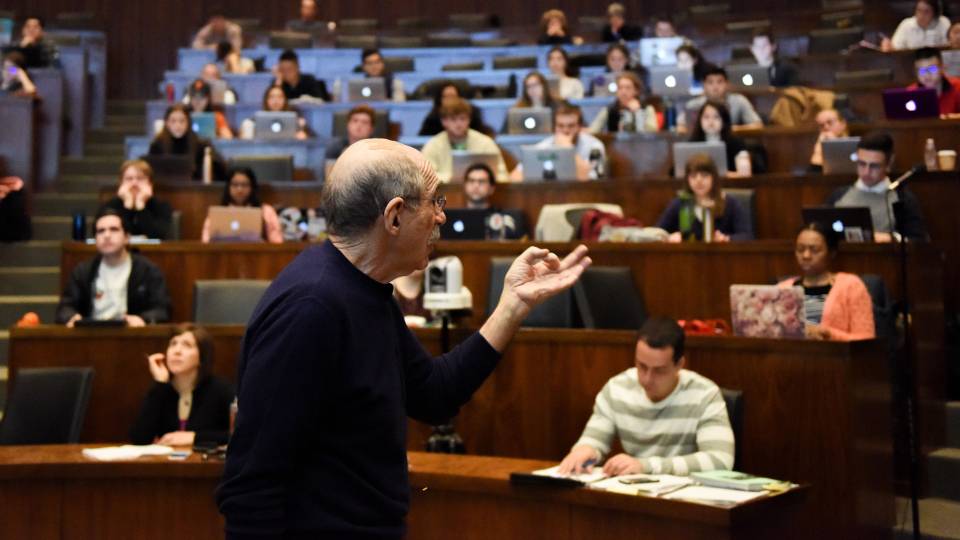A proposal from an interdisciplinary group of Princeton faculty has been selected by the Princeton Institute for International and Regional Studies (PIIRS) executive committee to become the first PIIRS research community to receive funding under an initiative announced earlier this year. The research community, “Communicating Uncertainty: Science, Institutions and Ethics in the Politics of Global Climate Change,” is composed of 16 faculty members representing nine departments and three programs or projects and is poised to establish Princeton University as a leader in this developing field.
The research community, whose members work in disciplines ranging from engineering to political philosophy, will receive up to $750,000 from PIIRS over three years to support research, course development and conferences. It will examine issues of uncertainty with respect to global climate change and other international environmental problems from the perspectives of natural, social and political science with the aim of improving the capacity to discuss and weigh related policy prescriptions. Fall 2011 will see the first round of activities generated by the research community.
“Communicating the state of the science of international environmental problems has proven very difficult,” said Robert O. Keohane, professor of international affairs in Princeton’s Woodrow Wilson School of Public and International Affairs and the research community’s first-year coordinator. “Our goal is to understand the intended meaning of expert judgments by groups such as the Intergovernmental Panel on Climate Change, how these groups communicate their findings, and how these findings are viewed by publics and thereby contribute to policy discussions.”
The way in which scientists represent uncertainty, Keohane explained, differs from how members of the public view it. “Scientists routinely seek to estimate the degree of uncertainty of their inferences,” he said, “but when members of the public hear that the science is uncertain, they are inclined to think that policy changes should wait until the uncertainty is entirely resolved. Unfortunately, on issues such as climate change, by the time the uncertainty is resolved, it may be too late to act effectively, or inordinately expensive to do so.”
Issues of communicating uncertainty emerged prominently in the fall 2010 semester among members of a luncheon discussion group convened by Keohane and Robert Socolow, professor of mechanical and aerospace engineering and co-director of the Carbon Mitigation Initiative at the University. The group was composed of Princeton scholars who work on issues related to climate change. The new research community will build on this initial group, extending it further and providing resources for its activities and development.
According to PIIRS Director Mark Beissinger, “The research community initiative is intended to bring faculty and students together across disciplines in ways that they ordinarily might not interact, in order to engage important issues within international and regional studies. The politics surrounding climate change represents one of the critical issues facing our global community. PIIRS is proud to sponsor, as its first research community, this multidisciplinary initiative addressing the challenges presented by global environmental governance.”
Through its multiple lenses, the research community will draw on the expertise of the National Ocean and Atmospheric Administration’s Geophysical Fluid Dynamics Laboratory to work on real cases. The laboratory, located on Princeton University’s Forrestal Campus, is one of the world’s leading climate modeling centers. Scholars from several disciplines will be involved:
· Climate scientists will provide an understanding of the kinds of scientific uncertainties that arise.
· Historians will contribute perspective on how uncertainty has been handled in the past regarding fields in which public policy depends in part on scientific knowledge.
· Specialists on international relations will analyze the politics of climate change within global institutions, while regional specialists will examine a series of case studies of societies that have been more or less successful in adopting policy measures aimed at addressing the effects of climate change.
· Social scientists will use their understanding of various audiences -- ranging from high-level nonscientist policymakers to the general public -- to investigate how uncertainty by scientists working on climate and other international environmental issues is understood by these audiences.
· Ethicists will examine how policymakers concerned with ethics make decisions in light of uncertainty: the moral and political principles in play, what constitutes responsible communication of underlying science and policy rationale, and the institutional design that best facilitates such communication.
The research community’s inaugural public cosponsored event will be an international conference on climate ethics organized by research community member Peter Singer, the Ira W. Decamp Professor of Bioethics in the University Center for Human Values and well-known author of “Animal Liberation.” The conference will be held in October on the Princeton campus. In addition to monthly community meetings, support for existing courses related to the issue area, and work on new undergraduate course development, outreach for the coming year includes two other conferences; workshops; meetings with colleagues from Columbia, Harvard, and New York universities in an effort to engage in joint research; a website; and a public lecture series.
In addition to Keohane, Singer and Socolow, the research community faculty members include Charles Beitz, the Edwards S. Sanford Professor of Politics and director of the University Center for Human Values; Daniela Campello, assistant professor of politics and international affairs, Woodrow Wilson School; Melissa Lane, professor of politics, acting director of the Program in Political Philosophy, and director of the Program in Values and Public Life; Stephen Macedo, the Laurance S. Rockefeller Professor of Politics and the University Center for Human Values; Denise Mauzerall, associate professor of civil and environmental engineering and public and international affairs, Woodrow Wilson School; Helen Milner, the B.C. Forbes Professor of Public Affairs, professor of politics and international affairs, Woodrow Wilson School, director of the Center for Globalization and Governance, and chair of the Department of Politics; Michael Oppenheimer, the Albert G. Milbank Professor of Geosciences and International Affairs, Woodrow Wilson School; Daniel Osherson, the Henry R. Luce Professor of Information Technology, Consciousness, and Culture and professor of psychology; Stephen Pacala, the Frederick D. Petrie Professor in Ecology and Evolutionary Biology and director of the Princeton Environmental Institute; Venkatachalam Ramaswamy, lecturer with the rank of professor in geosciences and atmospheric and oceanic sciences; Harold Shapiro, president of the University, emeritus, and professor of economics and public affairs, Woodrow Wilson School; Keith Wailoo, the Townsend Martin Professor of History and Public Affairs; and David Wilcove, professor of ecology and evolutionary biology and public affairs, Woodrow Wilson School.
For more information about the research communities initiative, visit the PIIRS website at https://www.princeton.edu/piirs/research/research-communities/.




